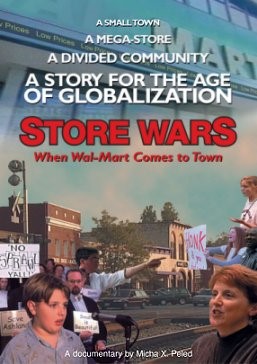
Walmart Inc. is an American multinational retail corporation that operates a chain of hypermarkets, discount department stores, and grocery stores in the United States, headquartered in Bentonville, Arkansas. The company was founded by brothers Sam and James "Bud" Walton in nearby Rogers, Arkansas in 1962 and incorporated under Delaware General Corporation Law on October 31, 1969. It also owns and operates Sam's Club retail warehouses.

Walmart de México y Centroamérica, also known as Walmex, is the Mexican and Central American Walmart division. Walmart de México y Centroamérica is the Walmart's largest division outside the U.S. as of October 31, 2022, consists of 2,804 stores around the country, including 300 Walmart Supercenter stores and 167 Sam's Club stores. It has been traded in the Mexican Stock Exchange since 1977. Walmart de México y Centroamérica is the biggest retailer in Latin America.

Outfoxed: Rupert Murdoch's War on Journalism is a 2004 documentary film by filmmaker Robert Greenwald about Fox News Channel's and its owner's, Rupert Murdoch, promotion of conservative views. The film says this bias belies the channel's motto of being "Fair and Balanced".

The American multinational retail chain Walmart has been criticized by many groups and individuals, such as labor unions and small-town advocates, for its policies and business practices, and their effects. Criticisms include charges of racial and gender discrimination, foreign product sourcing, anti-competitive practices, treatment of product suppliers, environmental practices, the use of public subsidies, and its surveillance of its employees. The company has denied any wrongdoing and said that low prices are the result of efficiency.

Robert Greenwald is an American filmmaker, and the founder of Brave New Films, a nonprofit film and advocacy organization whose work is distributed for free in concert with nonprofit partners and movements in order to educate and mobilize for progressive causes. With Brave New Films, Greenwald has made investigative documentaries such as Uncovered: The War on Iraq (2004), Outfoxed: Rupert Murdoch's War on Journalism (2004), Wal-Mart: The High Cost of Low Price (2005), Iraq for Sale: The War Profiteers (2006), Rethink Afghanistan (2009), Koch Brothers Exposed (2012), and War on Whistleblowers (2013), Suppressed 2020: The Fight to Vote (2020), Suppressed and Sabotaged: The Fight to Vote (2022), Beyond Bars: A Son's Fight for Justice (2022) as well as many short investigative films and internet videos.
American Jobs is a 2004 independent film, documentary, written, produced and directed by Greg Spotts. The film is about the loss of American jobs to low-wage foreign competition, covering the phenomenon of outsourcing in manufacturing and high-paying white-collar jobs. The filmmaker visited 19 cities and towns throughout the United States interviewing recently laid-off workers, focusing on three industries: textiles, commercial aircraft and information technology. It also contains interviews with a number of members of Congress, including: Sherrod Brown (D-Ohio), Rosa DeLauro (D-Connecticut), Robin Hayes, Donald Manzullo (R-Illinois), and Hilda Solis (D-California), and includes an extended section of clips from the 1993 congressional debate on NAFTA..
Thomas Martin Coughlin was an American businessman who served as vice chairman of Wal-Mart Stores, Inc. and confidant of founder Sam Walton.

Unprecedented: The 2000 Presidential Election is a 2002 47-minute documentary directed and co-written by Richard Ray Pérez and Joan Sekler, and narrated by Peter Coyote, about the contested 2000 presidential election in Florida.
Walmarting or Walmartization is a neologism referring to U.S. discount department store Walmart with three meanings. The first use is similar to the concept of globalization and is used pejoratively by critics and neutrally by businesses seeking to emulate Walmart's success. The second, pejorative, use refers to the homogenization of the retail sector because of those practices. The third, neutral, use refers to the act of actually shopping at Walmart.
Working Families for Walmart is an advocacy group formed by Walmart and the Edelman public relations firm on December 20, 2005. It has been used to praise Walmart in a show of opposition to union-funded groups such as Wake Up Wal-Mart and Wal-Mart Watch. The group is financially supported by Walmart and is headquartered in Edelman's Washington, D.C. office. It is not organized as a non-profit, and is not required to disclose its sources of funding.
Wake Up Wal-Mart was a campaign founded by United Food and Commercial Workers Union. It was based in Washington, D.C., and was often critical of the business practices of Walmart, the world's largest retailer, and the largest private employer in the United States. The group claimed Walmart was offering its employees substandard wages and health care benefits, and called on the retailer to improve both. Wake Up Wal-Mart was founded April 5, 2005, and maintained the web site WakeupWalMart.com, the centerpiece of the organization. The organization is now defunct. Its website is no longer active and the url wakeupwalmart.com now redirects to another UFCW-funded group, Making Change At Walmart.
Walmart Watch, formed in the spring of 2005, was a joint project of the Center for Community and Corporate Ethics, a nonprofit organization studying the impact of large corporations on society, and its advocacy arm, Five Stones. The Walmart Watch group was based in Washington with the claimed goal to challenge Walmart to become a better employer, neighbor, and corporate citizen in order to improve the wages, health benefits, and treatment of workers.
Walmart Canada is a Canadian retail corporation and the subsidiary of U.S.-based multinational retail conglomerate Walmart. Headquartered in Mississauga, Ontario, it was founded on March 17, 1994, with the purchase of the Woolco Canada chain from the F. W. Woolworth Company.

The history of Walmart, an American discount department store chain, began in 1950 when businessman Sam Walton purchased a store from Luther E. Harrison in Oklahoma City ,Oklahoma, and opened Walton's 5 & 10. The Walmart chain proper was founded in 1962 with a single store in Rogers, expanding inside Oklahoma by 1968 and throughout the rest of the Southern United States by the 1980s, ultimately operating a store in every state of the United States, plus its first stores in Canada, by 1995. The expansion was largely fueled by new store construction, although the chains Mohr-Value and Kuhn's Big K were also acquired. The company introduced its warehouse club chain Sam's Club in 1983 and its first Supercenter stores in 1998.
Why Wal-Mart Works; and Why That Drives Some People C-R-A-Z-Y is a 2005 independent documentary film by Ron and Robert David Galloway. It investigates the reasons behind the financial success of the Walmart Corporation. The documentary suggests that many criticisms of Walmart arise from feelings of jealousy over the company's success.

Brave New Films (BNF) is a nonprofit film company based in Culver City, California. Founded by filmmaker Robert Greenwald, BNF produces feature-length documentaries and investigative videos that seek "to educate, influence and empower viewers to take action around issues that matter."
Wal-Mart v. Dukes, 564 U.S. 338 (2011), was a United States Supreme Court case in which the Court ruled that a group of roughly 1.5 million women could not be certified as a valid class of plaintiffs in a class-action lawsuit for employment discrimination against Walmart. Lead plaintiff Betty Dukes, a Walmart employee, and others alleged gender discrimination in pay and promotion policies and practices in Walmart stores.

The Wal-Mart Effect is a 2006 book by business journalist Charles Fishman, a senior editor at Fast Company magazine, which describes local and global economic effects attributable to the retail chain Walmart.

Carl Douglas McMillon is an American businessman, and the president and chief executive officer (CEO) of Walmart Inc. He sits on the retailer's board of directors. Having first joined the company as a summer associate in high school, he became the company's fifth CEO in 2014. He previously led the company's Sam's Club division, from 2005 to 2009, and Walmart International, from 2009 to 2013.

Store Wars: When Wal-Mart Comes to Town is a documentary based on true story, directed by filmmaker Micha Peled. The movie was released on October 2, 2001. It is Peled's second documentary after Will My Mother Go Back to Berlin?(1993). It is the part one of Peled's Globalization Trilogy where the other two films of the trilogy are China Blue(2005) and Bitter Seeds (2011). The film's music was directed by Pete Sears and the cinematography was taken care by Allen Moore. It was premiered in South by Southwest Film Festival in 2001. The documentary won CINE Golden Eagle Awards and Golden Gate award in San Francisco International Film Festival.











